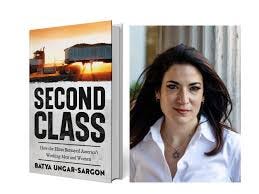'It Would Be Nice If Things Could Be Made a Bit Easier, That's All'
Batya Ungar-Sargon's "Second Class: How the Elites Betrayed America's Working Men and Women" allows ordinary Americans to speak for themselves
I didn’t particularly want to read this book, whose title is more polemical than its content (that’s publishing for you; I’ve had more than one title imposed on me). Not because I was indifferent to the topic—how to define, and address the problems of, the American working class—but because I heard the author speak on Andrew Sullivan’s podcast and, you know how it is: I felt like I had the gist of it after listening to her for 90 minutes. But I continued to think about what I’d heard in the days that followed, so I got a copy. And then when I started reading, I wasn’t sure I wanted to finish it because it seemed so anecdotal. But the cumulative impact of this short volume is substantial. It’s a very useful point of reference.
Batya Ungar-Sargon, the opinion editor at Newsweek, offers a sturdy scaffolding for three tiers of the working class: the struggling, the floating, and the rising. She then illustrates these categories with an exceptionally diverse cast of characters whom she sketches ethnographically (and quotes liberally), cutting across race, gender, geography, and ideology. After offering an answer to the “who” question in the first half of the book, she proceeds to identify a series of issues—wages, benefits, immigration, entitlements, and housing—that surface as recurring themes in her interviews.
Ungar-Sargon’s conclusions are clear: “Despite the radical diversity of the working class, there was a surprising consensus in the things that would help. Higher wages. Housing. Better health care. Fewer migrants competing for their jobs. Trade policy that favored America … There was a lot less diversity on questions of politics and policy than I had been expecting. Working-class Americans are keenly aware that more unites them as Americans than divides them.” At the center of that shared vision: a belief in the legitimacy of the American Dream, even if it’s often impeded, and an emphasis on hard work (often aided by unions, which loom large here) as the central value of a good life.
This may sound like a straightforward political program, but as Ungar-Sargon explains, “neither political party represents these positions. One party supports taxing corporations and expanding health care, but also allows teenagers to medically transition, and expands welfare and much more immigration. The other party wants to restrict immigration and limit welfare, but supports corporations and lowering taxes on the rich, and its representatives never utter the word ‘health care’ except as a slur.”
Ungar-Sargon argues that political polarization is largely an elite affectation in which cultural arguments obscure class interests. “Working-class people know that the unique set of policy proposals each party has chosen is arbitrary, so that have enormous forbearance for working-class people who pick the other party.” A shared cynicism about politics means that it never really matters all that much who’s in charge, and why a maverick like Donald Trump has been so appealing as someone who might shake things up, even if there’s plenty of skepticism about him.
Such positions are of course arguable. But there’s a freshness of vision here that’s worth taking seriously. For those who consider Olive Garden or Dairy Queen tasteless—or worse—the perspectives offered here are worth taking seriously, especially if you believe (as I do) that the country is paralyzed by party dysfunction and ideological posturing. We need a new politics that really represents these folks.

